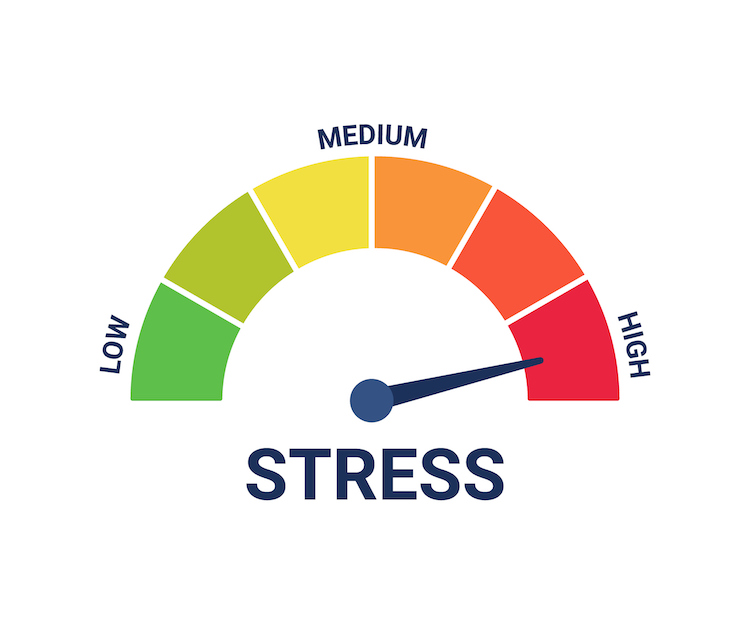
A certain amount of stress can be motivating; it can drive us to take action. Unfortunately, too much stress leads to changes that impact our mind, our body, and our relationships with the people around us.
During a presentation at the Midwest Forage Association’s annual symposium, extension specialist John Shutske acknowledged that farmers and those working in agricultural jobs face a lot of stress. Finances, labor shortages, health, and working with family are a few stressors that top the list.
He emphasized that feelings of stress aren’t just in our head; these stress hormones have a real impact on our brain. In the face of stress, the brain signals for the release of adrenaline and cortisol. Shutske, who works for the University of Wisconsin-Madison and its Division of Extension, said the fear center of the brain is activated and takes control, making it difficult to make good decisions.
Shutske said at times, stress can feel like a runaway thermostat, with a temperature that just keeps rising. While ratcheting down that stress is not easy, he encouraged the audience to find their “best stress throttle.” “What makes you feel better?” he asked. Are there things you can do that help you think clearly, sleep better, and make you feel less edgy?
There is no one single magic answer, Shutske said, but he encouraged people to find three or four practices they can put into place that will help throttle down their stress level. One recommendation was maintaining proper nutrition. He compared the human body to a machine. Most would not dream of putting poor quality fuel into an expensive tractor, yet we often don’t think twice about the food we eat.
Nobody eats perfectly, Shutske recognized, and that is okay. It’s about balance. He said we can all benefit from more fruits and vegetables, and we need healthy proteins to fuel us. Trying to make good decisions about food helps keep us healthy and can minimize some of the negative effects of stress.
Similarly, Shutske noted the importance of staying hydrated to lubricate the body. An easy way to check if you are drinking enough, he said, is to look at your urine. If it has any color to it, you could probably use more fluid intake. Water is always best, he reminded, and while caffeine can give an immediate boost of energy, it tends to dehydrate us.
Another action item people can take to maintain their health is to schedule routine checkups. Not only is this a chance to evaluate your physical health, but Shutske said you can also talk to your doctor about symptoms of stress you may be experiencing. “Stress, mental health, and physical health are closely tied,” he said.
Getting enough sleep can also reduce stress levels. Shutske said that some people think they can get by on a limited amount of sleep, but that affects their health in the long run. He encouraged people to try to get more sleep if they can and to practice good sleep strategies, so their quality of sleep improves as well.
Physical activity during the day can help people sleep at night, and it offers other health benefits, too. Shutske encouraged the audience to figure out what type of exercise they like and try to incorporate it into their schedule, because even a little bit of exercise has positive effects on the brain and stress levels.
Maintaining a positive outlook is another way to handle stress. Shutske said that we can “practice gratitude” by stopping for a few minutes each day to find something positive to appreciate. Taking time to smell the roses, if you will, can lead to less negative emotions, fewer physical symptoms of stress, better sleep quality, and greater satisfaction with life.
Planning or visioning can also help reduce stress. Making to do lists and checking off completed tasks relieves stress for some people.
Shutske also advised putting together a team of experts that can help navigate decisions for the farm. People who specialize in financials, legal issues, and various areas of production can provide support when needed, especially in times of stress.
As a final note, Shutske encouraged people to communicate and stay connected, even when feeling stressed out. In stressful times, many people tend to want to withdraw, but finding time to talk with others to stay connected can throttle stress and even help a person thrive during troubling times.

The author is the senior associate editor and covers animal health, dairy housing and equipment, and nutrient management. She grew up on a dairy farm near Plymouth, Wis., and previously served as a University of Wisconsin agricultural extension agent. She received a master’s degree from North Carolina State University and a bachelor’s from the University of Wisconsin-Madison.








